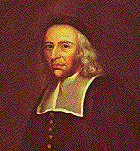John Leverett the Younger facts for kids
Quick facts for kids
John Leverett
|
|
|---|---|
 |
|
| President of Harvard College | |
| In office 1708–1724 |
|
| Preceded by | Samuel Willard acting |
| Succeeded by | Benjamin Wadsworth |
| Personal details | |
| Born | August 25, 1662 unknown |
| Died | May 3, 1724 (aged 61) unknown |
| Alma mater | Harvard College |
John Leverett (born August 25, 1662 – died May 3, 1724) was an important person in early American history. He was a lawyer, a politician, and a teacher. Most famously, he served as the President of Harvard College.
Contents
Early Life and Education
John Leverett was born in 1662. His father, Hudson Leverett, was a lawyer. His mother was Sarah (Payton) Leverett. John was also the grandson of John Leverett, who was a governor of the Massachusetts Bay Colony. This was an early English settlement in America.
John went to the Boston Latin School. This was one of the first public schools in America. After that, he studied at Harvard College. He earned his first degree, a Bachelor of Arts, in 1680. He then got his Master's degree in 1683.
Starting His Career
After finishing his studies, John Leverett stayed at Harvard. For twelve years, he was a resident fellow. This meant he lived at the college and helped run things. He started this role in 1685.
From 1688 to 1692, Harvard's president, Increase Mather, was away in England. During this time, John Leverett and William Brattle managed the college. They kept Harvard running smoothly.
Public Service and Family
John Leverett was very active in public life. He held many important jobs in the Province of Massachusetts Bay. This was the name for Massachusetts before it became a state.
Here are some of the roles he had:
- He was a justice of the peace starting in 1699. This meant he helped keep order and settle small legal problems.
- From 1702 to 1708, he was a judge in the highest court, the Superior Court.
- He also served as a judge for probate cases in Middlesex County. These cases dealt with wills and estates.
- From 1696 to 1702, he was a legislator. This means he helped make laws.
- He was even the Speaker of the House of Representatives from 1700 to 1702. This was a very important leadership role.
John Leverett married Margaret Rogers Berry in 1697. Margaret was the daughter of a former Harvard president, John Rogers. They had nine children together, but sadly, six of them died when they were very young. Margaret passed away in 1720. Later, John married Sarah Crisp Harris.
Military and Diplomatic Roles
John Leverett also played a part in military matters. During Queen Anne's War (1701–1713), he was an Indian commissioner for Massachusetts. His job was to talk with Native American groups. In 1704, he tried to convince the Iroquois people to join the British side in the war, but he was not successful.
He also led a group of volunteer soldiers. He was a lieutenant in the Ancient and Honorable Artillery Company. In 1707, he took part in attacks on a French fort called Port Royal in Acadia. These attacks were not successful.
In 1709, John Leverett acted as an emissary (a messenger or representative) for the Massachusetts Governor. He went to New York to talk with their governor. They discussed how Massachusetts and New York could work together to protect their borders. They also planned an invasion of Canada, but this plan was later stopped.
President of Harvard College
John Leverett became the President of Harvard on January 14, 1708. He served in this important role for sixteen years, until his death in 1724. As president, he was in charge of the college's daily operations and its future direction.
Land Development and Recognition
In 1719, Leverett helped start the Lincolnshire Company. This company wanted to develop land in a place called the Muscongus Patent in Maine. This land was part of Massachusetts at the time. John had inherited a share of this land from his grandfather. However, the company didn't achieve much. The land grant was later taken over by another person, Samuel Waldo.
In 1714, John Leverett was chosen as a Fellow of the Royal Society. This is a very old and respected group of scientists in England. Being a Fellow is a great honor, showing his achievements and knowledge.
John Leverett died on May 3, 1724. He was buried in the Old Burying Ground in Cambridge, Massachusetts.
 | Leon Lynch |
 | Milton P. Webster |
 | Ferdinand Smith |


